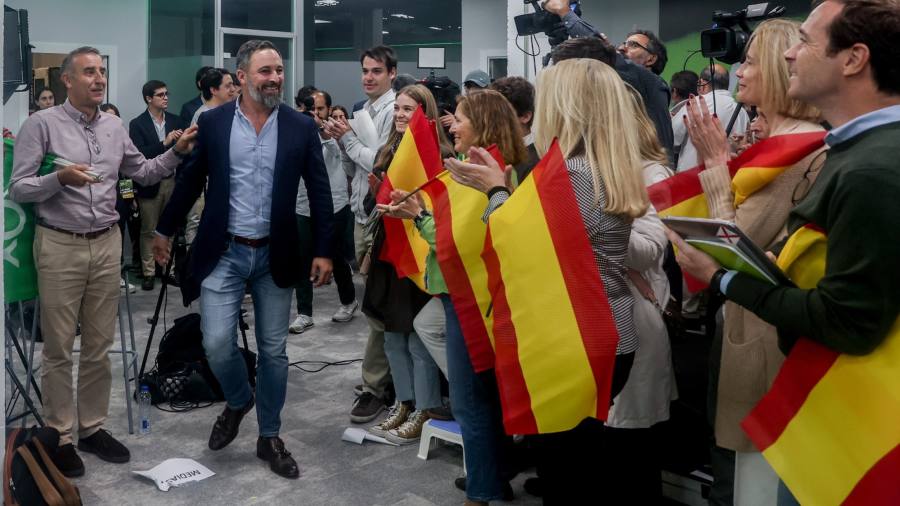
The prospect of Spain’s hard-right joining regional governments dominated the first unofficial day of campaigning for a snap general election even as the conservative opposition tried to focus elsewhere.
The ultra-conservative Vox party, which came in third in regional and local elections at the weekend, said on Tuesday it was “extending a hand” to the Popular party (PP) to form several regional governments where the PP had not obtained an absolute majority.
But Alberto Núñez Feijóo, the PP leader, ignored the topic as he addressed party members two days after an electoral “tsunami” that prompted Socialist prime minister Pedro Sánchez to call an early general election on July 23.
The closest Feijóo came to acknowledging his need for the hard-right party was in his praise for PP regional leaders who had secured absolute majorities, denying Vox and its leader Santiago Abascal any influence.
“Absolute majorities are my favourite thing,” Feijóo said to laughter. “For me absolute majorities bring a lot of pleasure.”
Sánchez’s Socialist party, however, tried to keep the prospect of PP-Vox alliances in the spotlight, calculating that the prospect of the hard-right in a national coalition after the general election will motivate some voters to support the left.
Isabel Rodríguez, spokesperson for the Socialist-led government, said: “I do not believe that the extreme right and the right that Abascal and Feijóo represent reflects Spanish society. This feeling of hatred does not prevail on the streets. Spain is a conciliatory country.”
The PP and Vox are united by their convictions that Sánchez has devalued Spanish institutions and their hostility to Catalan and Basque separatism.
Other issues divide them. Vox has long criticised the PP as a spineless establishment party and staked out antagonistic positions on immigration, feminism and globalisation that are unpalatable to many mainstream conservatives.

Ignacio Garriga, Vox’s secretary-general, suggested that co-operating with PP will come at a cost. In a television interview he said his party was “extending a hand” in the regions that voted on Sunday, but added that “Vox is not going to give away its votes to the PP”.
Asked about a national coalition after the general election, he said: “It is not out of the question.” Summing up Vox’s policies as “repeal and restore”, he added: “It is easier to do that from inside the government than from outside”.
Following the Sunday vote, PP-Vox coalitions are possible in at least five of Spain’s 17 regions, including Valencia, Aragón and Extremadura. They would come in addition to Castile-León, where the two parties formed their first governing coalition last year.
But Pilar Velasco, founder of Demócrata, a parliamentary news site, said Spain’s political timetable would give the PP a chance to “kick the can down the road” because it was not required to seal any regional deals until after July 23.
“That’s important because it means they can avoid governing with Vox before the general election, but it also prevents all the noise of negotiations over Vox’s ultra-right agenda,” she said. “Feijóo will do everything possible to avoid the vision of him as prime minister with Abascal as his deputy.”
An alternative path opened up in the Cantabria region on Tuesday, where a regionalist party not firmly moored on the left-right spectrum offered its support to the PP so it could govern without the ultraconservatives.
Vox posted the most-improved performance of any party on Sunday, doubling its share of the vote to more than 7 per cent.
But the same results were also a reminder that it must tread a fine line in confrontations with the PP.
In the previous legislative term in the Madrid region, the PP president Isabel Díaz Ayuso needed Vox to reach a majority but the ultraconservatives withheld their votes on a budget. Vox appeared to be punished for that on Sunday as Madrid voters gave a jubilant Ayuso an absolute majority on her own.
Separately on Tuesday, the PP was boosted by the announcement that Ciudadanos, a liberal party, would not field candidates in the general election. Its decision followed an abysmal showing on Sunday, when most of its former voters switched to the PP.
Elsewhere, Yolanda Díaz, one of Sánchez’s deputy prime ministers, registered her new Sumar group with the authorities as she tries to make it an umbrella for fractious parties to the left of the Socialists.

